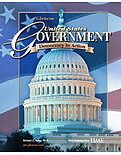1 A) a vice president. B) a deputy secretary. C) a secretary. D) an assistant secretary. 2 A) General Services Administration. B) Environmental Protection Agency. C) Bureau of Labor Statistics. D) Central Intelligence Agency. 3 A) federal workers knew little about their jobs. B) people made large profits from government contracts. C) jobs were bought and sold. D) rotation in office was more democratic. 4 A) classified employees. B) cabinet secretaries. C) presidential aides. D) ambassadors. 5 A) Department of Labor. B) Food and Drug Administration. C) Department of Education. D) Commerce Department. 6 A) defense contractors. B) the American Legion. C) labor unions. D) drug companies. 7 A) Department of Justice. B) Department of Labor. C) Department of the Treasury. D) Department of Defense. 8 A) one has a board of directors and the other executive officers. B) investors support the first and Congress supports the second. C) the first is flexible and the second rigid. D) one reinvests profits and the other returns them to taxpayers. 9 A) incompetent workers are difficult to fire. B) salaries are competitive with those in private business. C) retired workers receive half pay for the rest of their lives. D) workers have extensive health insurance. 10 A) president and presidential staff. B) House of Representatives. C) Senate committee heads. D) federal bureaucracy.





